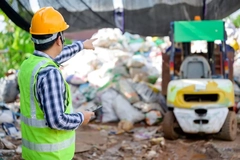UK Packaging Pact drives refill and reuse systems as EPR fees take effect
Key takeaways
- The UK Packaging Pact, led by WRAP, aims to accelerate refill and reuse systems nationwide as EPR fees take effect.
- The Pact is broadening its scope beyond plastics to the entire packaging system.
- The Pact will support Simpler Recycling rules in England by facilitating monomaterial designs, increasing domestic processing capacity, and phasing out problematic plastic formats.

The UK Packaging Pact, led by the Waste and Resources Action Programme (WRAP), continues to push for reductions in single-use packaging and scaling refill and reuse systems across the country, as producers have received invoices for the base fees under Year 1 of the EPR scheme for packaging.
Refill and reuse can be a lever, according to Sebastian Munden, chair at WRAP, since the same pack can be used multiple times, and EPR charges apply only when it first enters the market.
“There needs to be a supportive regulatory framework to incentivize reuse. We know that we need more funding to create the necessary infrastructure to truly scale reuse,” Munden tells Packaging Insights.
“From the trials to date, we have gained a lot of insights into what has and hasn’t worked, but ultimately to make the environmental and financial case stack up, we need to work collaboratively to ensure that we are offering a buy anywhere, return anywhere so it becomes easy for citizens to return their reusable containers.”
“The economies of scale will also be optimized if you have a multi-retailer/brand approach with interoperability at the heart of it alongside a level of standardized packaging.”
Circular ambition
The UK Packaging Pact is widening its scope from plastics to the whole packaging system, with goals, timelines, and accountability.
When scaling circular systems, the UK Packaging Pact pairs clear design rules with proof-of-scale programs in defined categories, measured against cost-to-serve, capture, quality, and customer repeat.
 According to Munden, overcoming uncertainty and apprehension was the key to getting consumers to choose reusable packaging.“Retailer and brand procurement standards create the demand pull. Open reporting and shared playbooks ensure others can copy rather than reinvent,” Munden says.
According to Munden, overcoming uncertainty and apprehension was the key to getting consumers to choose reusable packaging.“Retailer and brand procurement standards create the demand pull. Open reporting and shared playbooks ensure others can copy rather than reinvent,” Munden says.
“We’ll standardize data and align systems and tools, including the Recyclability Assessment Methodology, on-pack recycling label, and the scheme administrator for packaging EPR, so businesses can ‘report once, use many times’.”
“We aim to pull investment into UK infrastructure, and prioritize interoperable, convenient reuse so impact shows up in practice, not just on paper,” he adds.
Munden highlights that policy and enforcement need to work together to create fair and consistent conditions for recycling. Thus, the UK Packaging Pact is building domestic capacity and retaining value within the country rather than offshoring waste.
Upcoming requirements
In England, plastic film packaging and plastic bags will need to be collected with plastic recycling in 2027, according to the Simpler Recycling requirements. Munden emphasizes the importance of establishing a clear roadmap and ensuring that the supporting infrastructure is in place.
“This will push recyclable package rates up to around 90%. Currently, rigid plastic recyclability stands at 96%, but bags, films, and wrappers have significantly lower recyclability rates, which in turn brings the overall plastics recyclability down to around 70%. Solving bags, films, and wrappers will push it well over 90%.”
In the next five years, the UK Packaging Pact aims to support Simpler Recycling in England with continued design shifts to monomaterials and pave the way to additional UK wash and reprocess capacity.
According to Munden, it would also focus on completing the phase-out of remaining problematic formats particularly around PS and PVC, moving reuse from pilots to interoperable prefill and return systems in priority categories and underpin it with long-term end market stability and a simplified, consistent data regime.
With additional reporting from Milana Nikolova










